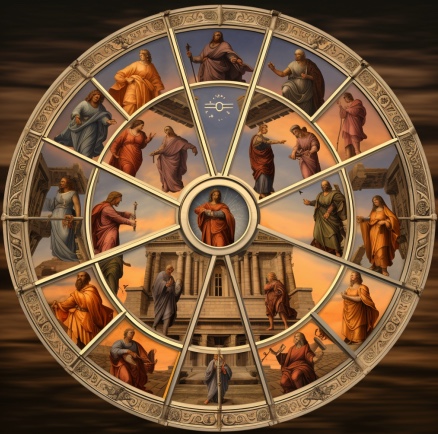Decoding the Roman Enneagram: Fact or Myth?
Believed by some to originate in Roman antiquity, the Enneagram, albeit frequently considered in contemporary times as an instrument for individual development and introspection, may in fact boast historical roots stretching back over two millennia. Although speculative, this hypothesis has proven sufficiently captivating to seize the fancy of numerous individuals despite the conspicuous absence of any objective substantiation. With a gaze into this ancient yet illuminating concept from the annals of Roman history, we shall embark upon an investigatory sojourn to ascertain the esoteric wisdom and customs that may yet be gleaned from a studious examination of the Enneagram of antiquity.

What is the Enneagram?
The Enneagram is a personality typing system that helps us understand ourselves and others. The theory delineates nine discrete personality variants, apportioning to each its peculiar fortes, foibles, and drivings. By grasping how the Enneagram framework elucidates our innermost motivations and tendencies, we can ascertain profound discernment into our customary conduct and that of our confederates. By cultivating deeper connections through more nuanced communication, we can foster more profound bonds.
The Theory of the Roman Era Enneagram
Although popularised recently, the Enneagram personality typing system is theorised to have origins dating back to the Roman era, where it was cultivated as an instrument for cultivating self-knowledge and personal development. The Roman philosophers and scholars, seeking insight into human nature and paths for cultivating wisdom, are said to have employed the Enneagram as an instrument by which the intricacies of the psyche might be plumbed and strategies for progress honed.
The Evidence for the Roman Era Enneagram
Though some intriguing linkages may be drawn between esoteric Roman understandings and the Enneagram, no unequivocal substantiation has yet been proffered to authenticate the hypothesis of its primal Roman origins. The renowned Roman orator and politician Cicero expounded at great length in his writings on this notion of excellence of character and the necessity of gaining insight into one's own true nature if any real progress is to be achieved. These ideas are central to the Enneagram and suggest that the Romans may have had some understanding of personality typing and self-awareness.

What This Means for Our Understanding of Ancient Knowledge and Practices
The theory of the Roman Era Enneagram is an intriguing idea that challenges our understanding of ancient knowledge and practices. Although lacking in definitive substantiation, this hypothesis brings to light thought-provoking queries regarding how antiquated civilizations conceptualised the human mind and cultivated approaches dedicated to individual progress and maturation.
The theory of the Roman Era Enneagram is an intriguing idea that challenges our understanding of ancient knowledge and practices. Although lacking irrefutable substantiation, this hypothesis prompts profound inquiry into how primeval civilizations comprehended the human mind and devised tactics for individual enhancement and maturation. Though debated as to origins in antiquity, nonetheless the Enneagram proves in present times a potent mechanism whereby introspection and maturation might be achieved. If you're interested in exploring the Enneagram further, consider taking a test
The intriguing Enneagram assessment, developed from millennia of perceptive observations into human temperament, awaits your participation today so as to unveil hidden parts of your distinctive character and impart arcane yet pragmatic wisdom which may have shaped this potent mechanism for cultivating self-knowledge and maturation.
Take the Enneagram test today to gain in-depth exploration of knowledge and experiences!
Get Started – Experience the Most Accurate and Insightful Enneagram Test Online at Enneagram Queen!